lesson 2
新概念二Lesson 2
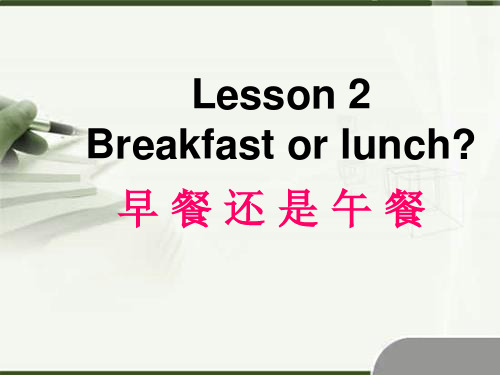
Exercises
A Write out these two paragraphs again. Give the right form of the words in parentheses.
1. I am looking out of my window. I can see some children in the street. The children ___________ are playing (play) football. They always play (play) football in the street. Now a _____ is kicking (kick) the ball. little boy _________ Another boy __________ is running (run) after him but he cannot catch him.
2)how 结构 (以形容词,副词为主) ① how + adj./adv. + 主 + 谓! ② how + adj. + a/(an) + cn.(单)+ 主 + 谓! ③ how + 主 + 谓!(实义动词作谓语)
他是一个多么可爱的男孩啊!
What a lovely boy he is! How lovely a boy he is! How lovely the boy is!
B Write these sentences again. Put the words in parenctheses in the right place. 1. She answers my letters. (rarely) She rarely answers my lettters. 2. We work after six o'clock. (never) We never work after six o'clock.
《Lesson 2》 教学设计
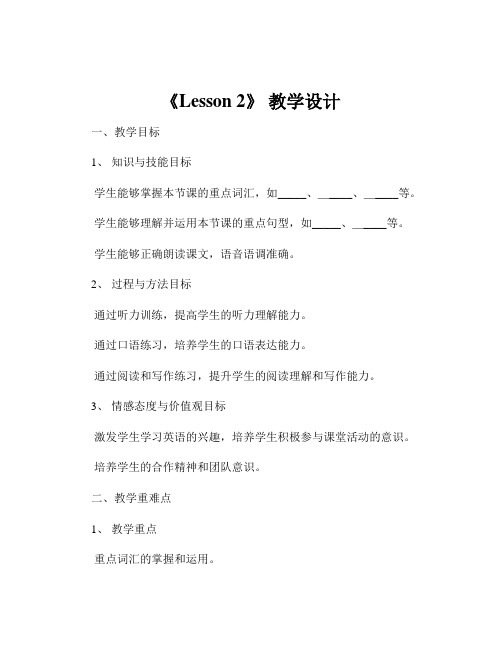
《Lesson 2》教学设计一、教学目标1、知识与技能目标学生能够掌握本节课的重点词汇,如_____、_____、_____等。
学生能够理解并运用本节课的重点句型,如_____、_____等。
学生能够正确朗读课文,语音语调准确。
2、过程与方法目标通过听力训练,提高学生的听力理解能力。
通过口语练习,培养学生的口语表达能力。
通过阅读和写作练习,提升学生的阅读理解和写作能力。
3、情感态度与价值观目标激发学生学习英语的兴趣,培养学生积极参与课堂活动的意识。
培养学生的合作精神和团队意识。
二、教学重难点1、教学重点重点词汇的掌握和运用。
重点句型的理解和运用。
2、教学难点如何让学生在实际情境中灵活运用所学知识。
如何培养学生的英语思维能力。
三、教学方法1、情景教学法通过创设生动有趣的情景,让学生在实际情境中学习和运用英语。
2、任务驱动法布置各种任务,让学生在完成任务的过程中提高英语能力。
3、合作学习法组织学生进行小组合作学习,培养学生的合作精神和团队意识。
四、教学过程1、导入(5 分钟)通过播放一段与本节课主题相关的英语视频或歌曲,引起学生的兴趣,导入新课。
提问学生关于视频或歌曲的内容,引导学生思考并回答问题。
2、词汇学习(10 分钟)展示本节课的重点词汇,通过图片、实物、动作等方式帮助学生理解词汇的含义。
带领学生朗读词汇,纠正发音。
组织学生进行词汇游戏,如单词接龙、猜单词等,巩固所学词汇。
3、句型学习(10 分钟)呈现本节课的重点句型,讲解句型的结构和用法。
给出例句,让学生模仿例句进行造句练习。
邀请学生展示自己的造句,进行点评和纠正。
4、听力训练(10 分钟)播放课文录音,让学生边听边理解课文内容。
提出问题,检查学生的听力理解情况。
再次播放录音,让学生跟读,模仿语音语调。
5、阅读训练(10 分钟)让学生自主阅读课文,理解课文大意。
组织学生进行小组讨论,回答与课文相关的问题。
邀请小组代表汇报讨论结果,进行总结和评价。
lesson 2

词序
例如:The dog is barking in the yard. 显然,该句在翻译成汉语时,地点状语须调整 才能符合中文表达习惯。这种情形主要出现在 定语、状语的位置方面。 如:The economy in China is growing rapidly. 中国经济正在迅速发展。
三、文化现象对比
语言作为文化的组成部分,既是文化的一种表 现形式,又是一种社会文化现象。因此,对于 以语言转换为基础的翻译工作来说,文化传达 就成了一个重要的主题。然而,基于文化与语 言的若干特点,翻译工作所能完成的只是尽可 能多地文化传递,“文化传真”则是一种理想 的境界,或是说,终极的目标。
句序
1. He had flown in just the day before from Hainan where he had spent his vacation basking in the Sanya sun after the completion of the construction job he had been engaged in in Nanjing. 他本来在南京从事一项建筑工程;任务完成之后,他 就去海南度假,享受三亚的阳光,昨天才坐飞机回来。 2. Window-smashers do not remain there to parley with the law’s minion. They take to their heels. 砸橱窗的人总是溜之大吉,不会逗留在那儿跟法律的 走卒打交道的。
I. English & Chinese:
A Comparison
语言对比的角度
1.物质实体。一是指语言本身赖以存在的物质 形式,二是指语言所表示的外部世界的现实事 物。2.语言环境。泛指语言赖以生存的社会环 境和语言使用的场合。3.交际情景。指人们在 使用语言进行交际时的特定情景。 与语言内部本身的组织结构系统相关的语内对 比。包括:1.语言系统。2.语言结构。3.语言 规则。4.语法功能。5.篇章功能。6.功能负荷 量。
新概念英语第二册Lesson_2思维导图ppt课件

Key points
aunt 姑、姨、婶、舅母
grandfather=grandpa grandmother=grandma, granny father=papa, Dad mother=mama, Mom aunt uncle son daughter brother sister step-father step-mother
Breakfast + Lunch =
2
Guess
•ly bird The early bird catches the worm.
Listening for the gist
--Why was the writer’s aunt surprised?
--Because he is still having breakfast and it’s already one o’clock.
7
8
9
Text
It was Sunday. I never get up early on Sundays. I sometimes stay in bed until lunchtime. Last Sunday I got up very late. I looked out of the window. It was dark outside. 'What a day!' I thought. 'It's raining again.' Just then, the telephone rang. It was my aunt Lucy. 'I've just arrived by train,' she said. 'I'm coming to see you.'
Lesson 2
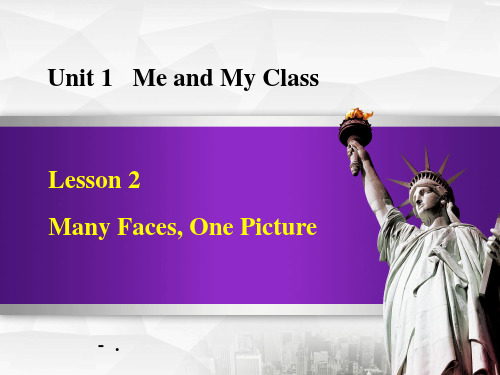
with
on
to
Listen and circle the correct answers.1.Wang Mei was wearing (traditional/sports) clothes in her picture.2.Wang Mei was (singing/dancing) in the picture.3.Li Ming prepared (two/three) pictures for the class picture.4.Li Ming chose a picture. In that picture,he was (planting a tree/riding a camel).
Unit 1
Many Faces, One Picture
Lesson 2
Me and My Class
- .
同学们,上一课学习的单词你们都掌握了吗?现在大家来检验一下,点击下面的音频开始听写吧!
Can you describe the people in this picture in English in the aspects of age, class and clothes?
讲解来自《点拨》
知识点
Lesson 2
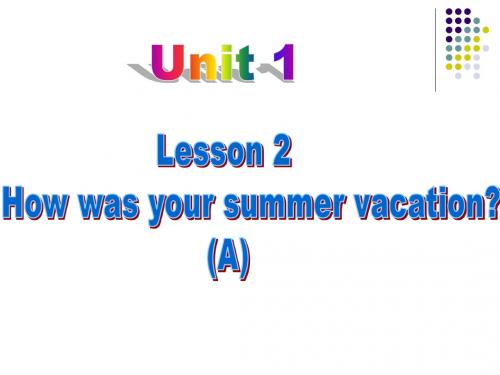
John
go swimming John went swimming at the club.
Make up questions.
What did Tim do on his summer vacation? Tim helped milk the cow and everything on his summer vacation.
Attention
would like to do = want to do
变同意句: 1. I would like to join the art club. I want to join the art club. 2. He would like to collect stamps.
He wants to collect stamps.
-- How was your summer vacation?
-- It was….
great cool terrific fantastic fun interesting exciting … boring awful
okay
just so-so
terrible
bad
…
Listen and number
11. Lisa trains at the ice rink twice a How often does Lisa train at the
Simple Past (一般过去时)
表示过去某时发生的动作或存在的状态,常与 yesterday, last week, ago, just now, one day等表 示过去的时间状语连用。 构成:主语+V.过去式……(肯定句) 主语+didn’t + V.原形……(否定句) Did +主语+ V.原形……?(一般疑问句) 特殊疑问词+一般疑问句? (特殊疑问句)
新概念课程讲解第四册Lesson2
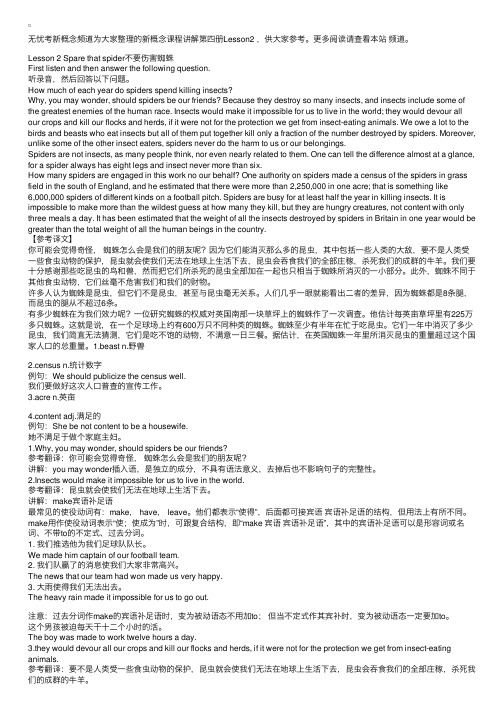
一些食虫动物的保护,昆虫就会使我们无法在地球上生活下去,昆虫会吞食我们的全部庄稼,杀死我们的成群的牛羊。我们要
十分感谢那些吃昆虫的鸟和兽,然而把它们所杀死的昆虫全部加在一起也只相当于蜘蛛所消灭的一小部分。此外,蜘蛛不同于
无忧考新概念频道为大家整理的新概念课程讲解第四册Lesson2 ,供大家参考。更多阅读请查看本站 频道。
Lesson 2 Spare that spider不要伤害蜘蛛 First listen and then answer the following question. 听录音,然后回答以下问题。 How much of each year do spiders spend killing insects? Why, you may wonder, should spiders be our friends? Because they destroy so many insects, and insects include some of the greatest enemies of the human race. Insects would make it impossible for us to live in the world; they would devour all our crops and kill our flocks and herds, if it were not for the protection we get from insect-eating animals. We owe a lot to the birds and beasts who eat insects but all of them put together kill only a fraction of the number destroyed by spiders. Moreover, unlike some of the other insect eaters, spiders never do the harm to us or our belongings. Spiders are not insects, as many people think, nor even nearly related to them. One can tell the difference almost at a glance, for a spider always has eight legs and insect never more than six. How many spiders are engaged in this work no our behalf? One authority on spiders made a census of the spiders in grass field in the south of England, and he estimated that there were more than 2,250,000 in one acre; that is something like 6,000,000 spiders of different kinds on a football pitch. Spiders are busy for at least half the year in killing insects. It is impossible to make more than the wildest guess at how many they kill, but they are hungry creatures, not content with only three meals a day. It has been estimated that the weight of all the insects destroyed by spiders in Britain in one year would be greater than the total weight of all the human beings in the country. 【参考译文】
新概念二册Lesson 2 单词
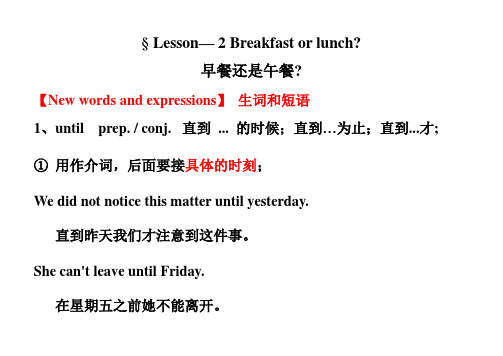
§ Lesson— 2 Breakfast or lunch?早餐还是午餐?【New words and expressions】生词和短语1、until prep. / conj. 直到... 的时候;直到…为止;直到...才;①用作介词,后面要接具体的时刻;We did not notice this matter until yesterday.直到昨天我们才注意到这件事。
She can't leave until Friday.在星期五之前她不能离开。
②用作连词,后面要接时间状语从句。
I'll work until he tells me to stop.我会一直工作到他叫我停下来为止。
Don't leave until we come back.在我们回来之前,不要离开。
③特殊句式直到昨晚九点,我们才完成这项工作。
Not until nine o'clock yesterday evening did we finish the work. (状语在句首,主句用倒装句)It was nine o'clock yesterday evening that we finished the work.(强调句式)= We did not finish the work until nine o'clock yesterday evening2、outside adv. “在外面”The house is painted green outside.那房子外面漆的绿色。
It's quite dark/ cold outside.外面很黑。
/外面很冷。
Wilson was waiting for me outside.威尔逊在外面等我。
3、ring (rang / rung) v.(铃、电话等) 响【这种响是刺耳的,往往是提醒人做某事】①用作及物动词S+~+ n./pron.The cyclist rang his bell loudly. 骑车的人使劲儿按车铃。
新概念英语第三册-Lesson2

• 10.“We'll get used to that Bill,” said the vicar. “13 is not as good as one but it's better than nothing. Now let's go downstairs and have a cup of tea.”
3.One night, however, our vicar woke up with a start: the clock was striking the hours!
• ★However • 在口语中, 主要用于句首;在作文中, 最好 用在句中、句尾。要用逗号分隔开来。
• • • •
★Start n.vt.惊跳, 惊起 -- The noise made him started(v.). -- What a start you gave me. -- he stood up with a start(n.).
★raise
• • • • • •
[reɪz]
v. 募集,筹款
4) v. 种植 raise wheat 种植小麦 5) v. 招募 raise an army 招募一支军队 6) v.提出,发出 raise a cheer 发出欢呼声
★torchlight [’tɔ:tʃlaɪt]n. 电筒光 • torch n.手电筒
Note on the text 课文详解
1.Our vicar is always raising money for one cause or another, but he has never managed to get enough money to have the church clock repaired. • ★ 现在进行时和 always等频度副 词搭配时:表示说 话人带有某种的情 感色彩。
《Lesson 2》 导学案
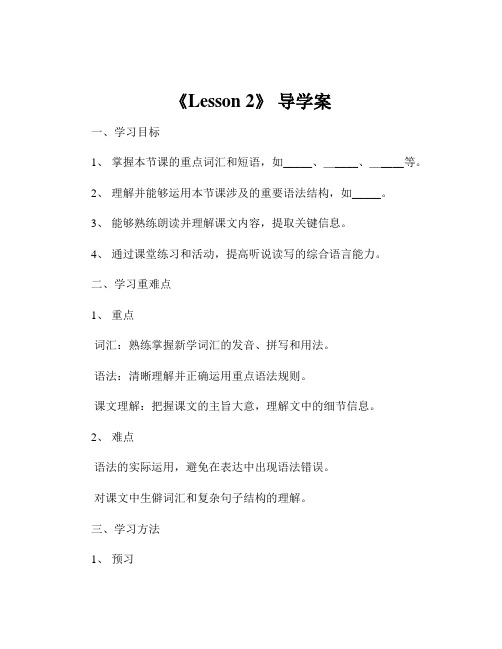
《Lesson 2》导学案一、学习目标1、掌握本节课的重点词汇和短语,如_____、_____、_____等。
2、理解并能够运用本节课涉及的重要语法结构,如_____。
3、能够熟练朗读并理解课文内容,提取关键信息。
4、通过课堂练习和活动,提高听说读写的综合语言能力。
二、学习重难点1、重点词汇:熟练掌握新学词汇的发音、拼写和用法。
语法:清晰理解并正确运用重点语法规则。
课文理解:把握课文的主旨大意,理解文中的细节信息。
2、难点语法的实际运用,避免在表达中出现语法错误。
对课文中生僻词汇和复杂句子结构的理解。
三、学习方法1、预习提前预习新单词,查阅词典了解其含义和用法。
通读课文,尝试理解大致内容,标记出不懂的地方。
2、课堂学习认真听讲,积极参与课堂互动,回答老师的问题。
做好笔记,记录重点知识和自己的疑问。
与同学进行小组讨论,共同解决问题。
3、复习课后及时复习所学内容,背诵单词和重点句型。
完成课后练习题,巩固所学知识。
多读多写,加强语言的实际运用能力。
四、学习过程1、词汇学习老师讲解新单词的发音、词性、词义和用法,并举例说明。
学生跟读单词,练习发音。
进行单词拼写练习,强化记忆。
2、语法讲解老师通过例句和情景,引入本节课的语法点。
详细讲解语法规则,分析语法结构。
学生做相关语法练习题,加深对语法的理解和运用。
3、课文学习老师领读课文,学生跟读,注意语音语调。
学生自主阅读课文,回答老师提出的问题,理解课文内容。
分析课文中的重点句子和段落,讲解语言点。
4、课堂活动小组活动:根据课文内容进行角色扮演或讨论。
个人展示:让学生用所学知识进行口头表达或书面写作。
5、课堂总结老师总结本节课的重点内容,强调易错点和难点。
学生回顾自己的学习成果,提出疑问。
五、课后作业1、背诵本节课的重点单词和短语。
2、完成课本上的练习题。
3、用所学语法和词汇写一篇短文,描述一个场景或事件。
六、拓展学习1、阅读相关的英语文章,扩大词汇量和提高阅读理解能力。
新概念二册Lesson 2 课文

§ Lesson— 2 Breakfast or lunch?早餐还是午餐?【课文讲解】1、It “虚主语”。
①、It’s already nine o’clock. 已是9点了。
【指时间】②、It is about 5 kilometers from the company to my home.从公司到我家大概有5公里。
【指距离】③、It was very quiet in the garden. 花园里很安静。
【指环境】④、It’s very cold today. 今天很冷。
【指天气等自然现象】It is raining. 正在下雨。
It’s 37℃today. 今天气温是37度。
⑤、--- How’s it going? “情况如何?”【笼统地谈论某情况】--- Well, not so good. “不是很好。
”⑥、It is a lovely baby. 这是个可爱的小婴儿。
【指人】It was my aunt Lucy. 是我姑妈Lucy打来的。
2、never adv. 从不;永不;决不;I will never forget your kindness. 我永远忘不了你的好意。
We never flinch from difficulties. 在困难面前我们决不退缩。
She never goes to the cinema. 她从来不看电影。
Never in my dreams did I think I would meet her again.我做梦都没想到会再见她。
★never可用于句首以加强语气,其后的句子要主谓倒装。
3、on Sunday s每逢星期天【on】后面所接的时间多与日期有关。
1.表示在具体的某一天(如日期、生日、节日或星期几)。
如:on May 4th,1919;on my birthday;on Teachers’ Day;on Monday 等。
新概念英语第三册Lesson-2
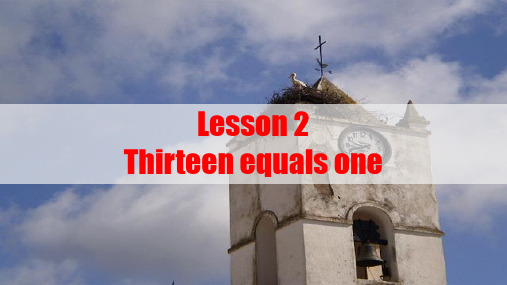
equal
adj.相等的
※ be equal to ...
※ equality ※ sexual equality/racial equality
raise
v.举起
raise your hand raise your voice raise your glass (to sb) raise a flag raise the roof raise one’s eyebrows (at/over...)
-- No one equals him in singing. matches
equal
n.同等的人;相等物;匹敌者
※ without equal/ have no equal 无敌;无与伦比
-- She has no equal in English in her class. -- She is a ski player without equal.
v Christianity v Buddhism v Islam
part 2 New words and expressions
equal raise vicar torchlight
v.等于 v.筹集;筹(款) n.牧师 n.电筒光
equal raise vicar torchlight
He is constantly going to the gym these days. When I am travelling, I normally use my laptop. I will instant message with a friend.
Our vicar is always raising money for one cause or another, but he has never managed to get enough money to have the church clock repaired.
新概念英语第二册Lesson 2
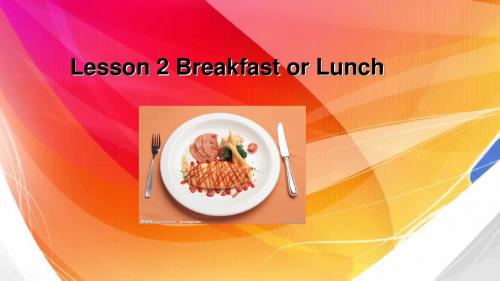
文化背景
早餐吃什么 V.S. 午餐怎么吃
歪果仁 早餐吃什么
New words and expressions
• until [ʌn'til]
If something happens until a particular time, it happens during the period before that time and stops at that time. 直到...才;直到...为止
it 的用法 1)人称代词 一般代指无生命的东西或有生命的动物,在不分性别或情况不详时指代 This is my watch. It's a Swiss one. The baby smiled when it saw its mother. 2)用作无人称动词的主语时,表示“时间、天气、距离” It's quite early yet. It's getting dark outside. It's not far from here. It's so cold now.
New words and expressions
• aunt [ɑːnt] [ænt]
the sister of your father or mother; the wife of your uncle
姨母; 舅母; 姑母; 伯母; 婶母
uncle ['ʌŋkl]
the brother of your father or mother; the husband of your aunt 叔叔;伯父;伯伯;舅父;姨丈;姑父
Notes on the text
新概念英语第一册Lesson2课件
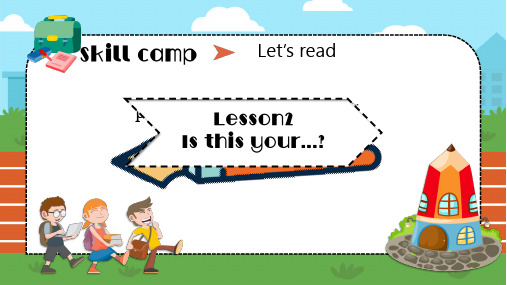
含有be动词的一般疑问句的构成:
但如果句子主语是第一人称,变成一般疑问句时 要将主语换成第二人称。如:
I’m a student.
Are you a student?
一般疑问句的回答:
一般疑问句的肯定回答一般为 “Yes,...”, 而否定 回答为 “No,...”。如:
Is this your house? 这是你的房子吗?
一般疑问句的概念: 能用yes/no(或相当于yes/no)回答的问句叫一般 疑问句。
含有be动词的一般疑问句的构成:
当陈述句中有be动词(am, is, are)时,可直接将 be动词提至主语前。如:
He is a worker.
She is eleven years old.
Is he a worker? Is she eleven years old?
Let’s write
提示词:excuse, yes, shoe, pardon, thank
Is thEixscuyoseurmseh!oe?
Thank PYyeaoYsrued.istov?iensr?.y much.
英语中be动词有am, is, are三种形式,它们分别和不同的人 称代词连用,我们先来学一学is的用法。请看下表:
Amazing world
Hi, guys!你们听过“包治百病” 这个词语吗?它的本意是“一 切疾病都可以治疗。”,不过 现在网络的流行说法是“包包 可以缓解女性不开心的情绪。” 可见,女士们对handbag的钟 爱啦!下面,请跟我一起看看 世界顶级品牌之一的迪奥包包 的制作过程吧!
This
your
pen.
It
is
your
watch.
lesson 2

Language points
I am really afraid of going to the dentist.
我真的害怕去看牙医。
be afraid of doing 担心或忧虑某事发生。
Don’t be afraid of asking questions.
不要害怕问问题。
I've always been afraid of spiders.
Imagine how scared I was!
想象一下我有多害怕! imagine 意为“想象,设想”。后面可跟宾 语从句。
They hadn’t imagined that it would be so difficult.
他们没想到会这么难?
“Did you hear a noise?” “No, you’re imagining things.”
I have no choice but to go with her.
我别无选择,只能跟她去。 but此句中作介词,意为“除了……”。后 面的不定式是介词宾语。 He want nothing but to stay here for another day. 他只是想在这里再待一天。 如果谓语动词为实意动词do的某种形式 ,but后可省略to I can do nothing but let him know.
4. The students complete the activities on their computers and wear their headphones to talk to their teacher.
headsets
5. These bananas will go bad in a week. rotten
七年级下册新概念2Lesson 2

2.助动词帮助动词构成时态的(do,does,will,shall,have,had,has) 3.情态动词:(must,can,may) p4 Exercises 1.are playing; "always" play; is kicking"now"; is running 2.are you doing; am leaving; (用进行时态表达将来时:go,come.leave,arrive join,return,die,land,meet) "别人用什么时态,你就用什么时态" are you leaving come go(I go to bed hungry.形容词做状语) (rarely 很少) listen "doesn't work" feel Special Difficulties】 难点 What+a/an+a.+n.+主语+谓语 What 对名词感叹
On Sundays: 所有的星期天,每逢星期天 never: 从来不 (可以直接用在动词前面) =not (变成否定句,前面一定要加助动词) I don't like her.=I never like her. 因为是上个星期,所以时态不是一般现在时。 look out of :朝窗外看 从...里:from,out of dark: 天很黑 What a day? What + a + n.——感叹句 It is terrible day.==> What a terrible day! What+a/an (+a.)+n.(+主语+谓语) What a terrible day! what a good girl (she is)! What a day! 有上下文和一定的语境,才能省略形容词。 just then: 就在那时 如果不知道对方性别,可以用it取代 Who are you?/Who is it ? just只会出现在"现在完成时" by train by 直接加交通工具(不能有任何修饰词,复数)
- 1、下载文档前请自行甄别文档内容的完整性,平台不提供额外的编辑、内容补充、找答案等附加服务。
- 2、"仅部分预览"的文档,不可在线预览部分如存在完整性等问题,可反馈申请退款(可完整预览的文档不适用该条件!)。
- 3、如文档侵犯您的权益,请联系客服反馈,我们会尽快为您处理(人工客服工作时间:9:00-18:30)。
Foreign trade also occurs because a country often does not have enough of a particular item to meet its needs. Although the United States is a major producer of sugar, it consumes more than it can produce internally and thus must import sugar.
Why Do We Trade With Other Countries ?
Economic activity began with the caveman, who was economically self-sufficient . He did his own hunting, found his own shelter, and provided for his own needs. As primitive populations grew and developed, the principle of division of labor evolved. One person was more able to perform certain activities than another, and therefore each person concentrated on what he did best. While one hunted, another fished. The hunter then traded his surplus to the fisherman and thus each benefitted from the variety of diet.
Third, one nation can sell some items at a lower cost than other countries. Japan has been able to export large quantities of radios and television sets because it can produce them more efficiently than other countries. It is cheaper for the United States to buy these from Japan than to produce them domestically. According to economic theory, Japan should produce and export those items from which it derives a comparative advantage. It should also buy and import what it needs from those countries that have a comparative advantage in the desired items.
For most nations, export and import are the most important international avtivity. When nations export more than they import, they are said to have a favorable balance of trade. When they import more than they export , an unfavorable balance of trade exists. Nations try to maintain a favorable balance of trade, which assures them of the means to buy necessary imports. Some nations, such as Great Britain in the nineteenth century, based their entire ecnomies on the concept of importing raw materials, processing them into manufactured goods, and then exporting the finished goods. The subsequent profits enabled these nations to import the food they needed.
In today's complex economic world, neither individuals nor nations are self-sufficient. Nations have utilized different economic recources; people have developed different skills. This is the foundation of world trade and economic activity. As a result of this trade and activity, international finance and banking have evolved.
Finally, foreign trade takes place because of innovation or style. Even though the United States produces more automobiles than any other county, it still imports large quantities of autos from Germany, Japan, and Sweden, primarily because there is a market for them in the United States.
The prudent exporter purchases insurance for his cargo’s voyage. While at sea, a cargo is vulnerable to many dangers. The most obvious danger is that the ship may sink. In this event, the exporter who has purchaseed insurance is reimbursed. Otherwise, he may suffer a complete lost. There is also the danger of damage to the cargo from a collapsed or leaky pipe, which could diminish the cargo’s value. Thus, insurance is another service in which some nations specialize. Great Britain, because of the development of Lloyd’s of London, is a leading exporter of this service, earning fees for insuring other nations’ foreign trade.
In addition to visible trade, which involves the import and export of goods and merchandise, there is also invisible trade, which involves the exchange of services between nations.
As an example of invisible trade, Brazilian coffee is usually transported by ocean vessels because these steamships are the cheapest method of transportation. Nations such as Greece and Norway have large maritime fleets, which can provide this transportation service. When an exporter arranges for this kind of transportation, he rents space in the cargo compartment of a ship for one voyage.
For example, the United States is a major consumer of coffee, yet it does not have the climate to grow any of its own. Consequently, the United States must import coffee from countries ( such as Brazil, Colombia, and Guatemala ) that grow coffee efficiently. On the other hand, the United States has large industrial plants capable of producing a variety of goods, such as chemicals and airplanes, which can be sold to nations that need them. If nations traded item for item, such as one automobile for 10,000 bags of coffee, foreign trade would be extremetly cumbersome and restrictive. But instead of barter, which is the trade of goods y, the United States receives money in payment for what it sells. It pays for Brazilian coffee with dollars, which Brazil can then use to buy wool from Australia, which in turn can buy textiles form Great Britain, which can then buy tobacco from the United States.
